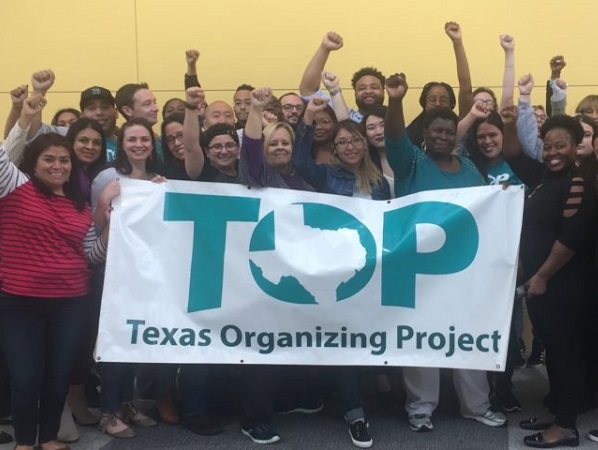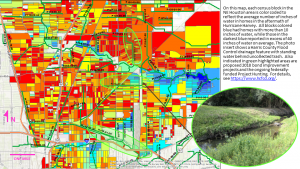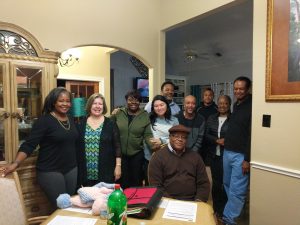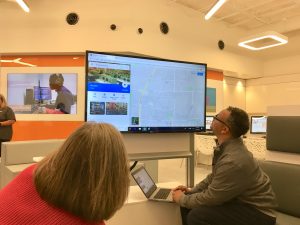Apply now to join our next cohort of Community Science Fellows and Community Leads!

Photo Courtesy of Constance C. Luo
The Team
Edith Wilson, Rock Whisperer LLC, [email protected]
Constance C. Luo, Community Organizer, Texas Organizing Project, [email protected]
Results
For the residents of Houston, Hurricane Harvey destroyed homes, lives, and traumatized families in multiple regions of the city. Many families experienced homelessness, medical illness, financial debt, loss of jobs, and lack of access to education following the storm. Multiple floods from Tropical Storm Allison (2001), Hurricane Ike (2008), and most recently Tropical Storm Imelda (2019) have caused extreme additive damage to communities of color in Northeast Houston. Flooding is not just associated with hurricanes and tropical storms, there have been major flood events between these episodes, such as the Memorial Day Floods of 2015.
Though the floodwaters of Harvey did not discriminate, the recovery process has disproportionately affected low income African American and Latino Houstonians. Many of the aid programs made available in the wake of Harvey were inaccessible to those who did not have homeowners or flood insurance and a lack of representation from local elected officials made seeking help and remedy difficult.
 The focus of this project was to better understand how and why the Northeast neighborhood of Houston (defined by zip codes 77078, 77028 and 77016), floods so often. This is a region of the city that floods multiple times per year even during small storm events and has seen little to no improvement to its drainage and flooding infrastructure.
The focus of this project was to better understand how and why the Northeast neighborhood of Houston (defined by zip codes 77078, 77028 and 77016), floods so often. This is a region of the city that floods multiple times per year even during small storm events and has seen little to no improvement to its drainage and flooding infrastructure.
Constance Luo, a Community Organizer with Texas Organizing Project (TOP), worked with Dr. Edith Wilson to understand the how, why and where of Northeast Houston’s flooding problem. This was achieved through in-person meetings between Edith and members of TOP as well as visits to the field to observe existing drainage infrastructure across the neighborhood. Edith trained TOP members and community leaders on how to access and interpret flooding infrastructure maps. Publicly available map data, including Digital Elevation Models and census data, were combined with local data on infrastructure to identify areas of community concern.

Edith Wilson (2nd from left) and Constance Luo (4th from left) with TOP members
This collaborative project has led to success in (1) TOP building better relationships with local governments, the City of Houston and Harris County, regarding flooding infrastructure and (2) TOP successfully asking Harris County to prioritize low income communities to receive $2.5 million dollars in flood bonds to improve flooding infrastructure and prevent flooding in low income communities long-term.
Project Outputs:
Project Impacts:

Edith (left) demonstrates map capabilities to TOP members.
The impact of this project was very significant for TOP members, Northeast Houston residents and greater Houston community. Specifically:
Reflections
From this project, others may learn better ways to partner with Thriving Earth Exchange for their own purposes. For instance,
The team noted that the following contributed to the success of the project:
However, there were a few key things that the team would do differently if they had the chance to do this project again:
To other teams currently pursuing Thriving Earth Exchange projects and for those that anticipate doing a Thriving Earth Exchange project, the team recommends:
In the aftermath of Hurricane Harvey in 2017, the neighborhoods of east and northeast Houston suffered extensive damage. Majority of the drowning deaths from the storm occurred outside the mapped flood zones designated as being in the 100- and 500- year floodplains, including the zip code of 77078. This region is known officially as Northeast Houston by the City of Houston and Harris County but informally called East Houston by residents. Nearly one year after the storm hit Southeast Texas, many people in the predominately African American and Latino communities of Northeast Houston find themselves still suffering from the impacts of the storm. Many residents are now living in temporary mobile home parks, houses contaminated with mold, and facing the reality of an outdated and crumbling drainage system. Storm drains and ditches throughout this area of the city become clogged and go unaddressed, further exacerbating flooding. Residents also report feeling traumatized by the unprecedented impact Harvey made and lacking confidence that they will remain protected during future storms.
The Texas Organizing Project (TOP) is a community-based non-profit working to improve the lives of low-income and working-class Texas families through civic and electoral engagement as well as community organizing. The group conducts direct action organizing around issue campaigns such as education reform, criminal justice, and affordable housing. A recent campaign has rallied residents around the issue of resilient flooding infrastructure. Homeowners are tired of just talking about the issue and want to see real action around flood infrastructure improvements.
TOP would like to find a scientific partner who can help them obtain a better understanding of Northeast Houston’s flood risk and outline a step-wise process on how to fix their specific drainage issues. The goal of this TEX project is to bring scientific evidence and understanding to the questions and priorities of local residents, so that residents can use that science to make decisions and take actions.
This project has been conceived and designed in partnership with community leaders at Texas Organizing Project and with our national partner, Flood Forum USA.
Community Lead

Constance C. Luo is a Community Organizer with the Texas Organizing Project (TOP), a community based nonprofit organizing low income black and brown Texans for justice in their communities. She works closely with TOP membership to develop their leadership skills in public speaking, meeting with elected officials, facilitating meetings, member/volunteer recruitment and fundraising. She also leads the language justice program in the Harris County office, ensuring that all aspects of the organization are accessible for both English and Spanish speakers. Prior to her work with TOP, Constance worked as an organizer in Chicago in the areas of housing, political campaigns and voter registration.
Scientific Liaison

Edith Newton Wilson, PhD, owns Rock Whisperer LLC, a consulting firm that contracts with companies, engages in community outreach, and mentors young professionals who are interested in applying skills from the fossil fuel business – such as mapping, flow modeling, and risk assessment – to global clean energy, food and water projects. Prior to founding her business, Edith spent 25 years working with energy companies in various roles including geological exploration, commercial, and HR. She holds degrees in earth science from Dartmouth College and the Johns Hopkins University, where her dissertation work focused on low temperature aqueous geochemistry and fluid transport models. Edith lectures on research topics from induced seismicity in Oklahoma to economic factors driving the transformation to renewable energy, and she is engaged with community partners to expand clean energy deployment among young people in the informal settlements and townships of South Africa.
This project is part of one of TEXs’ new cohorts. TEX has partnered with Flood Forum USA which supports grassroots flood groups across the country by helping them develop strategies for a sustainable future. TEX is working with twelve of their grassroots groups to connect them with scientists who can help them better characterize neighborhood-level flood risks and work effectively with local decision makers to mitigate those risks.

(c) 2024 Thriving Earth Exchange